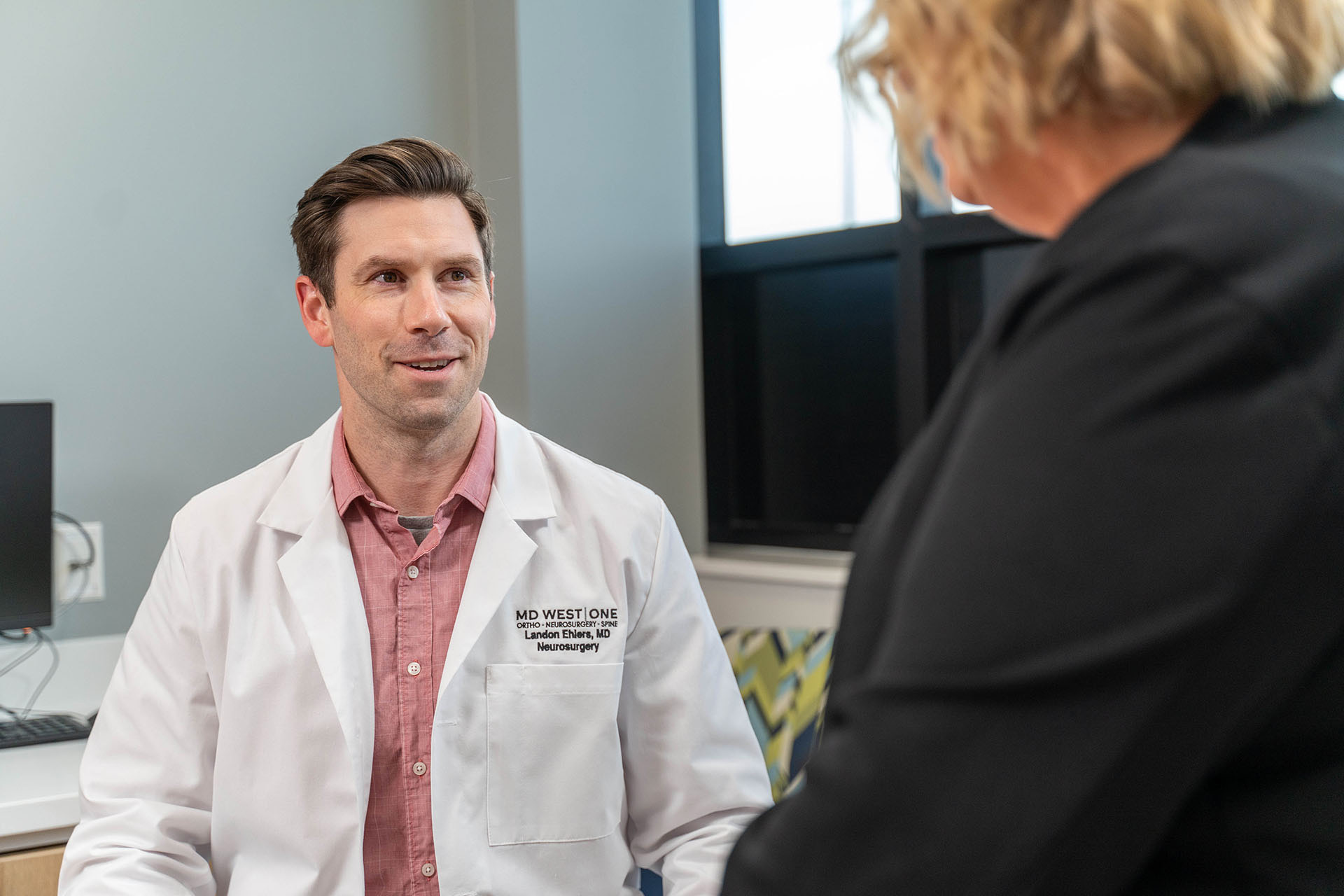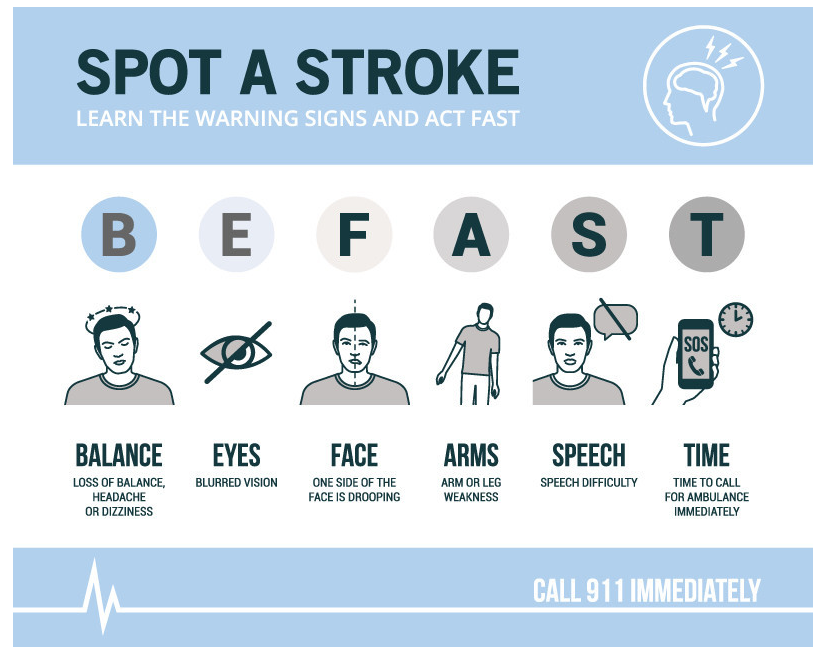
Dr. Landon Ehlers, Endovascular Neurosurgeon at MD West ONE
May is nationally recognized as Stroke Awareness Month, a time dedicated to raising awareness about one of the leading causes of death and long-term disability in the United States. Every 40 seconds, someone in the U.S. experiences a stroke—and every minute counts. Early recognition, swift action, and access to specialized care can significantly improve survival rates and long-term recovery.
At MD West ONE, we are committed to educating the community about stroke symptoms, prevention strategies, and the importance of timely intervention. Our endovascular neurosurgery team—Dr. Andrew Gard and Dr. Landon Ehlers—are at the forefront of stroke treatment in the Omaha area, performing complex, life-saving stroke procedures at Methodist Hospital.
Endovascular neurosurgeons play a critical role in the treatment of stroke, particularly in cases of ischemic stroke, which occurs when a blood clot blocks a vessel supplying blood to the brain. Using advanced imaging and minimally invasive techniques, these specialists access the brain through the body’s vascular system—often via a catheter inserted through the groin or wrist—to remove clots, repair damaged vessels, or place stents. This approach can restore blood flow quickly, reduce brain damage, and significantly improve patient outcomes.
During Stroke Awareness Month, MD West ONE encourages everyone to learn the signs of stroke, understand their personal risk factors, and take proactive steps to protect their brain health. With expert care available right here in Omaha, our community has access to some of the most advanced stroke treatments available—when every second truly matters.
Recognizing Stroke: Know the Signs
Time is critical when a stroke occurs. The acronym F.A.S.T. helps identify key warning signs:
- F – Face Drooping: One side of the face may droop or feel numb. Ask the person to smile and observe if it appears uneven.
- A – Arm Weakness: One arm may be weak or numb. Ask the person to raise both arms and see if one drifts downward.
- S – Speech Difficulty: Speech may be slurred or hard to understand. Ask the person to repeat a simple sentence.
- T – Time to Call 911: If any of these signs are present, call emergency services immediately. Additional symptoms can include sudden confusion, trouble seeing in one or both eyes, dizziness, loss of balance, or a severe headache with no known cause.

What to Do If You Suspect a Stroke
If someone shows signs of a stroke:
- Call 911 Immediately: Do not wait to see if symptoms improve.
- Note the Time: Document when symptoms began, as certain treatments are time-sensitive.
- Keep the Person Safe: Ensure they are in a safe position, preferably lying down with the head slightly elevated.
- Do Not Give Food or Drink: Swallowing may be impaired.
- Stay Calm and Reassuring: Keep the person as calm and comfortable as possible until help arrives.
Prompt medical attention is crucial to minimize brain damage and improve recovery chances.
Understanding Stroke Risk Factors
Several factors can increase the risk of stroke:
Medical Conditions
- High Blood Pressure: The leading cause of stroke.
- Diabetes: Increases stroke risk by up to four times.
- High Cholesterol: Can lead to plaque buildup in arteries.
- Heart Diseases: Including atrial fibrillation and heart failure.
- Obstructive Sleep Apnea: Linked to increased stroke risk.
Lifestyle Factors
- Smoking: Doubles the risk of ischemic stroke.
- Physical Inactivity: Contributes to obesity and other risk factors.
- Poor Diet: High in saturated fats, trans fats, and sodium.
- Excessive Alcohol Consumption: Can raise blood pressure and triglyceride levels.
Uncontrollable Factors
- Age: Risk increases with age, especially after 65.
- Family History: Genetic predisposition to stroke.
- Gender and Race: Certain groups may have higher risk levels.
Awareness of these factors is essential for prevention and early intervention.
Preventing Stroke: Steps You Can Take
Up to 80% of strokes are preventable through lifestyle changes and medical management:
- Monitor Blood Pressure: Keep it within a healthy range.
- Manage Diabetes and Cholesterol: Follow medical advice to control these conditions.
- Adopt a Healthy Diet: Emphasize fruits, vegetables, whole grains, and lean proteins.
- Exercise Regularly: Aim for at least 150 minutes of moderate-intensity aerobic activity each week.
- Avoid Tobacco and Limit Alcohol: Both can significantly increase stroke risk. Maintain a Healthy Weight: Reduces strain on the cardiovascular system.
- Get Adequate Sleep: Aim for 7–9 hours per night.
Implementing these measures can significantly reduce the likelihood of experiencing a stroke.
Expert Stroke Care from MD West ONE at Methodist Hospital
In Omaha, MD West ONE offers specialized endovascular neurosurgery services for stroke patients. Our team includes:
Both physicians perform stroke surgeries at Methodist Hospitals, utilizing state-of-the-art techniques to improve patient outcomes.
Stroke Awareness is Vital
By recognizing the signs, understanding risk factors, and taking preventive steps, you can protect yourself and others. For those in the Omaha area, MD West ONE’s dedicated team stands ready to provide expert care when it matters most.
